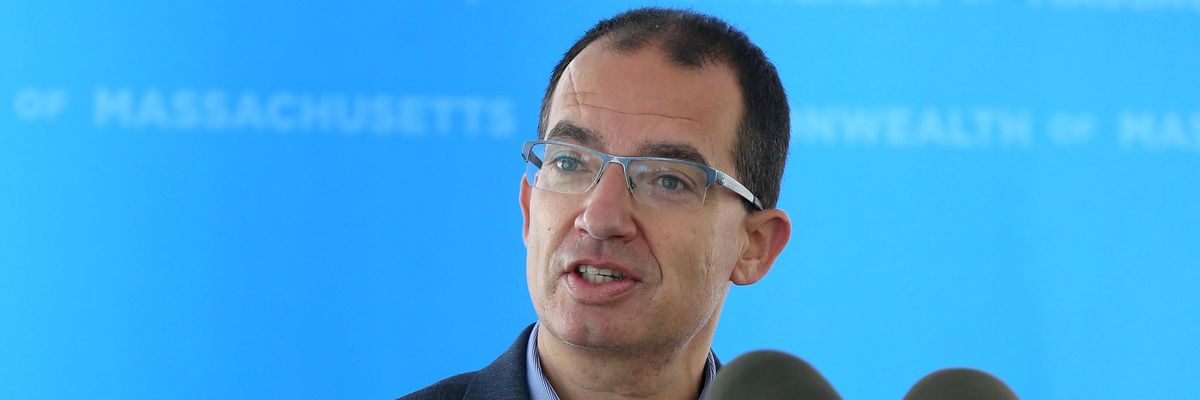Vaccine equity campaigners on Tuesday accused Moderna of continuing its stranglehold over lifesaving technology in response to the biotechnology company's announcement that includes a vow to never enforce Covid-19 patents in some lower-income countries.
"Everyone should have access to this lifesaving technology, which is why governments need to waive intellectual property rules and break vaccine monopolies."
"Moderna is clearly feeling the pressure from the millions of people challenging their lucrative monopoly, but their billionaire CEO shouldn't get to choose who lives and who dies in this pandemic," said Julia Kosgei, policy advisor at the People's Vaccine Alliance, in a statement.
"Everyone," she said, "should have access to this lifesaving technology, which is why governments need to waive intellectual property rules and break vaccine monopolies."
In a shift from its stance not to enforce patents for the duration of the pandemic, Moderna announced Tuesday that it would not enforce the protections for its publicly funded coronavirus vaccine at any time on manufacturers in the 92 countries able to access doses through Gavi's COVAX Advance Market Commitment mechanism.
The World Health Organization's global messenger RNA (mRNA) vaccine technology transfer hub in South Africa--where researchers last month successfully created an mRNA-based coronavirus vaccine modeled after Moderna's--would also be covered under that pledge, Politico reported.
The company additionally announced a new mRNA vaccine manufacturing plant in Kenya as well as a tool to help allow international researchers access to Moderna's mRNA platform and "explore novel vaccine designs against prototype viral families in preparation for Disease X." The intellectual property rights of vaccines developed this way would be jointly owned by the researchers and Moderna, according to FT.
"Our pledge further highlights our commitment to global access," Moderna CEO Stephane Bancel--whose company stands accused of "continuously putting Africa last in line"--said in a statement.
In an interview with Politico, Bancel also defended not working with the WHO hub in South Africa, calling it "not a good use of our time," as his company's engineers would be redirected from other work.
According to Kosgei of the People's Vaccine Alliance, "If Moderna really cared about vaccine access for low and middle-income countries, they would share their vaccine blueprints with the WHO's Covid-19 technology access pool, cooperate with the WHO mRNA hub in South Africa, and revoke the patents they have filed in that country."
"Instead," she said, "lives have been lost while Moderna has sat on their hands. And now they claim that helping the biggest mRNA manufacturing effort in the Global South would not be a good use of their time. Meanwhile, many middle-income countries, including most of Latin America, are excluded from Moderna's licensing proposal and will still pay top dollar for lifesaving medicines."
"It's appalling," said Kosgei.
In a Twitter thread, Global Justice Now director Nick Dearden called Moderna's new pledge on patents "the absolute minimum we should expect" and simply "not enough."
Part of the issue, according to Dearden, is that "Moderna's vaccine is the U.S. govt. vaccine. They paid for it."
Dearden further to the company's dispute over ownership and said that "if the U.S. wins, they could share the technology freely with the WHO. So Moderna might have no choice in the matter."
Dearden also took issue with Moderna's limits on the patent pledge, noting for example that it excludes South Africa, "which is the country *actually researching* an mRNA vaccine so it can share it with the world."
Additionally, said Dearden, "not taking legal action isn't the same as *sharing* its publicly funded vaccine know-how. When the WHO asked for this, Moderna refused, costing many lives."
"Companies like Moderna make such money by monopolizing knowhow which, if shared openly, could help create a healthier and fairer world," he said, pointing to the firm's 70% profit margin on the vaccines.
Peter Maybarduk, director of Public Citizen's Access to Medicines program, echoed that message.
"Moderna needs to be challenged," tweeted Maybarduk, "and governments need to step up, to free mRNA technology and NIH-Moderna, the people's vaccine, for the world."




